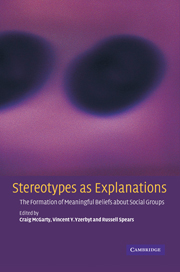Book contents
- Frontmatter
- Contents
- List of figures
- List of contributors
- Preface
- 1 Social, cultural and cognitive factors in stereotype formation
- 2 Stereotype formation as category formation
- 3 Subjective essentialism and the emergence of stereotypes
- 4 The role of theories in the formation of stereotype content
- 5 Illusory correlation and stereotype formation: making sense of group differences and cognitive biases
- 6 Dependence and the formation of stereotyped beliefs about groups: from interpersonal to intergroup perception
- 7 Four degrees of stereotype formation: differentiation by any means necessary
- 8 From personal pictures in the head to collective tools in the world: how shared stereotypes allow groups to represent and change social reality
- 9 Conclusion: stereotypes are selective, variable and contested explanations
- References
- Author index
- Subject index
4 - The role of theories in the formation of stereotype content
Published online by Cambridge University Press: 22 September 2009
- Frontmatter
- Contents
- List of figures
- List of contributors
- Preface
- 1 Social, cultural and cognitive factors in stereotype formation
- 2 Stereotype formation as category formation
- 3 Subjective essentialism and the emergence of stereotypes
- 4 The role of theories in the formation of stereotype content
- 5 Illusory correlation and stereotype formation: making sense of group differences and cognitive biases
- 6 Dependence and the formation of stereotyped beliefs about groups: from interpersonal to intergroup perception
- 7 Four degrees of stereotype formation: differentiation by any means necessary
- 8 From personal pictures in the head to collective tools in the world: how shared stereotypes allow groups to represent and change social reality
- 9 Conclusion: stereotypes are selective, variable and contested explanations
- References
- Author index
- Subject index
Summary
Introduction
… groups differ in many ways. Some of the attributes that differentiate one group from other groups will become stereotypic of the group, whereas other such attributes will not. What determines which differences between groups will become central to the content of the stereotype? This is an important question but one that has been relatively neglected by social cognitive research.
(Hamilton, Stroessner & Driscoll, 1994, p. 309)In recent decades the emphasis of research into stereotype formation, and indeed stereotyping more generally, has tended to be on process rather than content. The rise of the social cognition approach within this field has shifted the focus of research towards an investigation of the cognitive processes involved in stereotyping. This is also true of approaches to stereotype formation, such as distinctiveness-based illusory correlation (Hamilton & Gifford, 1976). The actual content of stereotypes has appeared somewhat secondary in such accounts. However, recently we are witnessing something of a revival of interest in the content issue, with increased research into the functions served by stereotypes and an emphasis on stereotypes as ‘aids to explanations’ (see McGarty, Yzerbyt & Spears, this volume). Indeed, if one takes a ‘meaning’ based approach to stereotype formation, it would seem that the content of stereotypes should be highly significant to understanding stereotypes as explanations or sense-making devices.
In this chapter we take the formation of stereotype content as our focus.
- Type
- Chapter
- Information
- Stereotypes as ExplanationsThe Formation of Meaningful Beliefs about Social Groups, pp. 67 - 89Publisher: Cambridge University PressPrint publication year: 2002
- 17
- Cited by



